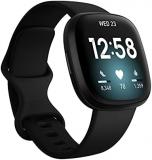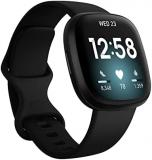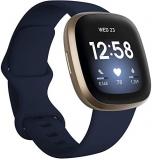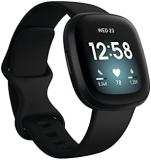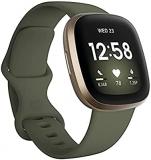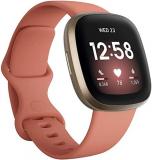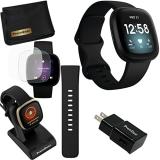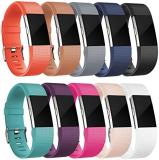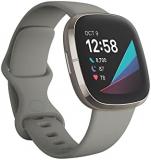When it comes to smart fitness wearables, two names often stand out: the Fitbit Charge 5 and the Fitbit Versa 3. Each represents Fitbit‘s mastery of balancing health technology with modern style, yet their designs cater to different needs. This comparison explores how these two exceptional devices differ, their unique strengths, and which might be the perfect fit for your fitness journey.
The Fitbit Charge 5 excels as a sleek, compact tracker focused on health metrics and everyday fitness. It is lightweight, unobtrusive, and highly efficient–a reflection of Fitbit’s core philosophy. The Fitbit Versa 3, on the other hand, is a full-fledged smartwatch with a larger display, voice assistant integration, and deeper smart features. Both models share the same commitment to accuracy and style, making them equally suitable as a Fitbit Watch for men or a Fitbit Watch for women.
Design is the first notable distinction between the two. The Charge 5’s streamlined profile and aluminum casing make it nearly weightless, perfect for users who prioritize minimalism. In contrast, the Fitbit Versa 3 embraces a smartwatch aesthetic, featuring a large AMOLED touchscreen that supports more apps and interactive widgets. If you value a subtle, bracelet-like device, the Charge 5 is ideal. However, if you prefer a visually rich interface akin to the Fitbit Sense or Fitbit Sense 2, the Versa 3 stands out.
Performance and tracking capabilities reveal both devices’ true strengths. The Fitbit Charge 5 offers EDA stress monitoring, ECG, and advanced heart rate tracking–technologies also found in models like the Fitbit Luxe and Fitbit Versa 4. It focuses on health-first functionality, giving users an accurate view of their physiological state. Meanwhile, the Versa 3 emphasizes versatility with built-in Alexa and Google Assistant, music storage, and voice control. While both provide GPS tracking, the Charge 5’s integration of readiness scores and stress management tools gives it an edge for wellness-focused users.
Battery life is another defining factor. The Fitbit Charge 5 provides up to seven days of use, depending on settings, while the Fitbit Versa 3 averages around six days. Though similar, the smaller Charge 5 tends to conserve energy more effectively due to its lighter operating system. This makes it appealing for those who dislike frequent charging. However, the Versa 3 compensates with its quick-charge feature, providing a full day’s power in just 12 minutes–ideal for people on the go.
When comparing ecosystem integration, both models connect seamlessly to the Fitbit app, offering insights into heart rate, stress levels, and activity zones. Yet, the Versa 3 includes additional smart capabilities such as call answering via Bluetooth and expanded notification management. Fitness data from devices like the Fitbit Inspire 3 and Fitbit Inspire 2 syncs effortlessly with both, but the Charge 5 presents it in a more streamlined way. The result is a refined experience that emphasizes clarity and focus over app complexity.
The Fitbit Charge 5’s compact design makes it perfect for users who prefer a pure fitness tracker with minimal distractions. It’s particularly appealing to athletes or health enthusiasts who prioritize performance metrics. Conversely, the Fitbit Versa 3 targets users who want a balance between smartwatch functionality and fitness tracking. Whether used alongside other models like the Fitbit Ace 3 or Fitbit Versa 2, it provides the smartwatch feel without sacrificing accuracy.
Style versatility also plays a key role. The Fitbit Versa 3 supports multiple strap materials–silicone, leather, or stainless steel–allowing personalization for different occasions. The Charge 5, while more understated, offers elegance through simplicity. It’s the kind of device that transitions effortlessly from gym sessions to professional environments. Whether chosen as a Fitbit Watch for men for rugged use or as a Fitbit Watch for women for everyday elegance, both watches deliver sophistication in their own ways.
Ultimately, deciding between the Fitbit Charge 5 and the Fitbit Versa 3 depends on lifestyle priorities. If your goal is a lightweight tracker with advanced health monitoring similar to the Fitbit Sense 2, the Charge 5 is the right choice. However, if you value smart features, voice control, and broader app compatibility, the Versa 3 offers more. Both models maintain Fitbit’s signature precision, reliability, and comfort. Together, they exemplify how Fitbit continues to lead the fitness technology landscape–offering personalized innovation that adapts to every user’s rhythm, ambition, and style.
